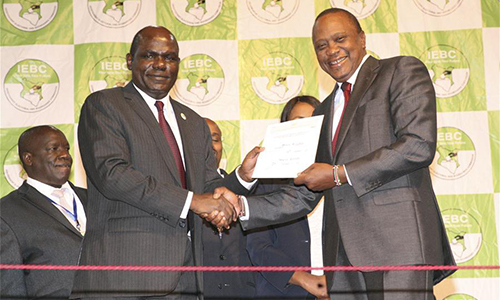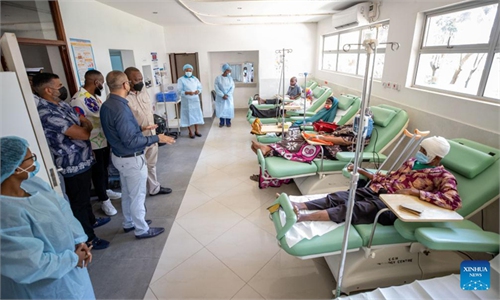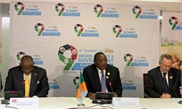
Kenyan President Uhuru Kenyatta (R, front) receives the certificate as the winner of the repeat presidential election from Independent Electoral and Boundary Commission (IEBC) chairman Wafula Chabukati in Nairobi, capital of Kenya, Oct. 30, 2017. Kenya's Uhuru Kenyatta won the repeat presidential elections boycotted by opposition, garnering 98.2 percent of the vote cast, Kenya's electoral body said on Monday.(Xinhua/Charles Onyango)
Kenyan President Uhuru Kenyatta on Monday committed to strengthening regional infrastructure in order to boost intra-Africa trade.
Kenyatta, in a speech read on his behalf by James Macharia, the cabinet secretary in the Ministry of Transport, Infrastructure, Housing, Urban Development and Public Works, told a continental forum in Nairobi, the Kenyan capital, that his government will continue to build road networks to link the northern transport corridor that connects landlocked countries in East Africa to Kenya's port of Mombasa.
"We cannot fully benefit from the African Continental Free Trade Area [AfCFTA] without well-developed infrastructure," Macharia said during the opening ceremony of the 7th Program for Infrastructure Development in Africa (PIDA) Week.
Macharia stressed that Kenya has also prioritized the development of the Lamu Port-South Sudan-Ethiopia-Transport (LAPSSET) corridor project that will provide an alternative route for movement of cargo and passengers between Kenya and its northern neighbors.
He believes that Africa remains highly fragmented and lack of infrastructure remains a bigger challenge to trade as compared to tariff and nontariff barriers.
Amani Abou-Zeid, commissioner for Infrastructure and Energy at the African Union Commission, said that no meaningful development can take place without significant investment in infrastructure, urging the continent to embrace transnational infrastructure projects that are outward looking.
Xinhua



